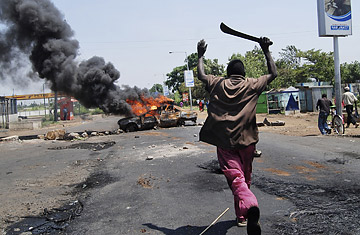
An opposition supporter wielding a machete runs toward a makeshift burning roadblock in Kisumu, Kenya, Thursday, January 31, 2008, following the shooting of Kenyan opposition lawmaker David Too by a police officer in Eldoret.
U.N. Secretary-General Ban Ki-moon jetted into Kenya on Friday for a round of talks aimed at easing Kenya's post-election crisis, traveling what has been a path well-trodden by high-profile diplomats as the world tries to keep the chaos here from mutating into all-out ethnic war. Already in Kenya was Ban's predecessor, Kofi Annan, who is mediating negotiations between President Mwai Kibaki's government and the opposition Orange Democratic Movement of Raila Odinga, who claims that Kibaki's associates stole the vote through massive vote rigging. Nelson Mandela's wife, Graca Machel, who is a U.N. expert on humanitarian issues as well as a former First Lady of Mozambique, has flown in to help bring the parties together. Former Tanzanian President Benjamin Mpaka is here, Ghana's President John Kufuor came and went, and South Africa's Cyril Ramaphosa, a businessman who helped negotiate an end to apartheid, is expected to arrive shortly.
The steady flow is a stark contrast to other crises in Africa. Last week, for example, the International Rescue Committee issued a report saying that 45,000 continue to die every month as a result of Congo's civil war. Zimbabwe's economy is still deteriorating fast — well beyond the international spotlight. And Amnesty International said Friday that conflict between the army and armed groups in Chad is only getting worse.
Analysts say there are many reasons for Kenya to get so more attention: It is an economic hub whose port delivers supplies to Uganda, Rwanda, Burundi, Somalia and South Sudan; and it is an important U.S. ally in the War on Terror. And the potential for even greater mayhem in Kenya remains high. Both Annan and former U.S. President Bill Clinton have acknowledged their failure to prevent or stop the Rwanda genocide. And while western pundits may dismiss the comparison, for Kenyans, the fear of a second Rwanda is very real. "I can see the beginnings of an ethnic conflict, I really can," says Mwalimu Mati, a local political activist. "Everyday, you've got more deaths, and these are in slums; they say Kibaki supporters were attacked or Odinga supporters were attacked, that's just code for Kikuyu and Luo [the respective tribes of the president and his rival]."
The diplomats are venturing into a country with a power vacuum. "I think Kibaki is getting very poor advice. He's showing no personal leadership in this crisis; I'm not quite sure who around him is making the decisions," says Richard Leakey, the world famous paleontologist and chairman of WildlifeDirect.org, who is active in Kenyan politics as an anti-corruption campaigner. "I think that's a large part of the problem — the country feels at sea without a captain. But ODM has made some pretty outrageous statements too. Everybody is playing bad guy on this and nobody is trying to play good guy."
Annan announced some progress in negotiations on Friday evening, telling a news conference that the two sides had pledged to try to end the violence and agreed to an agenda for future talks. Nonetheless, killings continued in western Kenya, with at least nine people slain, including a police officer.
So far, about 850 people have been killed in Kenya's crisis, and at least 250,000 displaced. On Thursday, the killing of a second ODM lawmaker in three days threatened to ignite further violence that has driven Kibaki's fellow Kikuyu tribesmen from areas dominated by predominantly Luo, Luhya and Kalenjin followers of Odinga. Conversely, Odinga supporters have also been driven from Kikuyu strongholds. "All international community, the whole world is watching you, the future is on your shoulders," U.N. Secretary-General Ban told a news conference upon his arrival. "This must stop, this is up to the Kenyan people. You must act according to all established practices in the modern world." The United States has offered the services of the FBI in the inquiry into the death of the ODM lawmaker who was gunned down outside his home on Tuesday.
